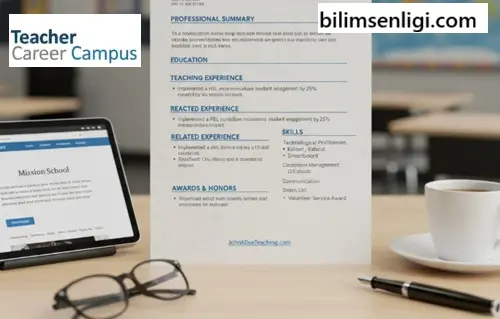When applying for a position in the field of education, you may be asked about your Teaching Philosophy. It is very beneficial to evaluate your own teaching process to understand your skills and strengths. Potential employers may ask this question to understand if your teaching methods and styles align with those of their school or organization. Preparing for this question in advance can help you feel ready and answer with confidence.
In this article, we present possible discussion topics, tips, and example answers.
What is a Teaching Philosophy and Why is it Important?
A Teaching Philosophy is your set of beliefs, ethical understanding, and principles regarding teaching. It has likely developed over time through practical teaching experience, education, observations, and research. The philosophy summarizes your teaching approach and guides you in the daily situations you encounter in the classroom or training environment.
If you are unsure about your teaching philosophy, consider asking yourself the following questions:
- Which teachers/educators inspired me?
- What is my approach when a student or employee is struggling?
- How do I reward good behavior? How do I handle bad behavior?
- What standards do I hold myself to?
- What were the most successful moments in my teaching life?
- What would my students or employees say about me?
Writing down your answers to these questions can help you notice common themes and determine your teaching philosophy.
Why Do Employers Ask: “What is Your Teaching Philosophy?”
When employers ask this question, they want to get an idea of how you will carry out your teaching duties. Your answer should include your teaching methods, your beliefs about the learning process, and at least one example of your skills and abilities in a classroom or training environment.
Whether you are interviewing for a position at an educational institution or a company is hiring someone to train other professionals, employers want to ensure that your methods align with their organization’s goals and values.
This question is a way for employers to measure your personal skills and determine if you have the necessary knowledge and experience to perform the job duties. When an interviewer asks you about your teaching philosophy, they are looking for clues about how you will address students or trainees, how you will approach teaching challenges, and how you will ensure the success of every learner.
Examples of Teaching Philosophy Answers
Here are a few ways to share your teaching philosophy statement:
1. When Applying for a Leadership or Corporate Training Position
You can apply the following tips when applying for a job where you will be responsible for training new employees or informing existing employees about new tools or processes. This is more appropriate for companies than for schools.
Example: “My teaching philosophy is to make every training session as interactive as possible. I believe that an interactive curriculum is more memorable. I use tactics like role-playing and competitive quiz games. As the Customer Service Director, I was responsible for the training of new representatives. When I first started, I noticed that the new representatives were making many mistakes and forgetting much of what they learned in their first few weeks on the job. Instead of changing the curriculum, I changed the presentation.
I now randomly select trainees and have them act out customer and representative roles in front of the rest of the class. I also end every session with a pop quiz and give small prizes to the trainee who answers the most questions correctly. By gamifying the experience, we reduced errors and increased the retention of the training material.”
2. When Applying for a Position at an Educational Institution (Experienced Teacher)
As an experienced teacher, you can use a similar approach when applying to elementary, middle, high school, or university. In this case, you may specifically want to share one of your successful teaching experiences.
Example: “My teaching philosophy is focused on developing independent study habits in students. I find that even if students attend class, they often forget important details because they haven’t learned how to properly review the subject on their own. I am of the opinion that helping middle school students learn to work independently prepares them better for the requirements of high school and university classes.
In my current role as a seventh-grade History teacher, I frequently give pop quizzes on the previous day’s lesson material to ensure students recall the information. This past year, I started allocating 10 minutes of silent study time at the beginning of every class for students to review yesterday’s lesson material. Since then, the pop quiz scores have increased by more than 50%.”
3. When Applying for Your First Teaching Role (New Teacher)
Finally, you can apply the above when entering the job market for the first time in a teaching position. Instead of sharing examples of your professional experiences, you can share examples of teaching styles that influenced your philosophy.
Example: “My teaching philosophy is to make the content I teach more relatable. In most cases, when a student cannot identify with the material, it is more difficult to extract meaning. As a Literature teacher, my goal is to help students empathize with the characters, settings, and concepts, especially when these are different from their own life experiences.
When I was a student, I found the stories where my teachers helped me draw parallels more memorable. As a student teacher, I like to draw comparisons between old texts like Shakespeare and modern events. For example, I believe that comparing events in the plays to events in popular culture not only helps students understand the stories but also helps them draw their own conclusions.”
Whenever you apply for a position that requires teaching or training, employers are likely to ask about your teaching philosophy. In addition, you should be prepared for additional questions related to the experiences you shared. By preparing your answer in advance, you can highlight your relevant skills, share the right example, and leave a positive and lasting impression.
6 Tips for Answering the Question “What is Your Teaching Philosophy?”
Six tips you should keep in mind:
1. Keep it Concise
Be as straightforward as possible. Start by thinking about what teaching should achieve, list the methods you use to reach that goal, and then tell a story that exemplifies those methods.
2. Speak in the Present Tense
Use phrases like “I believe a teacher should do…” or “I use these strategies…”, rather than talking about your beliefs and skills in the past tense; for example, “I learned that this is best…” or “I helped students achieve…”. This gives a more active tone to your philosophy.
3. Avoid Unnecessary Jargon
Explain your teaching philosophy using easy-to-understand, everyday language, rather than complex and technical terms. This will ensure that the interviewer fully comprehends your answer and notices your strengths. Also, it helps them apply your answer to their own organization, especially if you are changing industries.
4. Use Concrete Examples
When sharing your teaching philosophy, “showing” is just as important as “telling”. Provide your interviewer with insight into your teaching methods by offering detailed examples from your past experiences. Discuss how you applied your methods and the positive results you achieved with your teaching style.
5. Practice
Since this is a frequently asked interview question in the education sector, you should prepare and rehearse this answer before the interview.
6. Show Enthusiasm
Employers want to see your passion for teaching; make sure your excitement is reflected in your answer.






